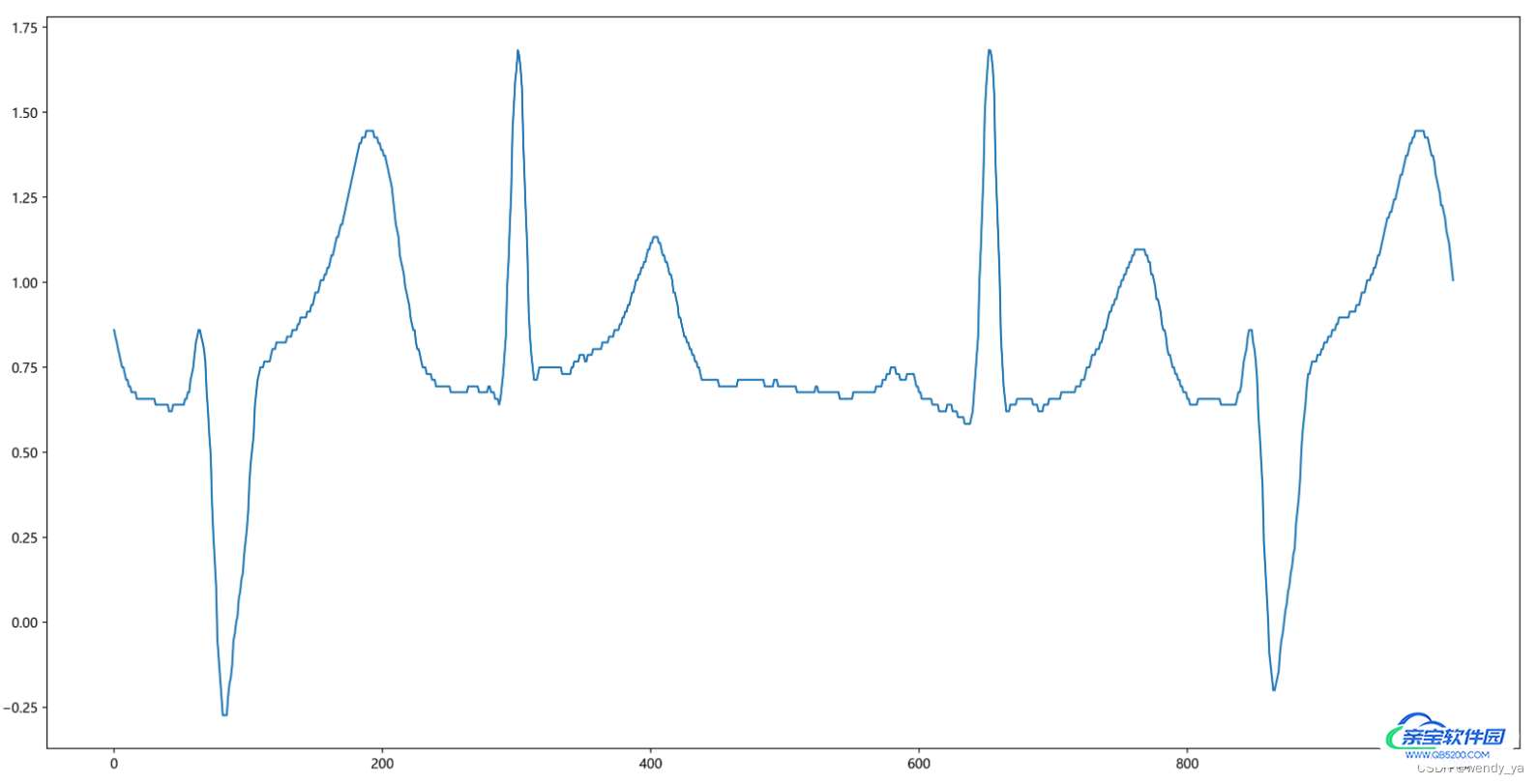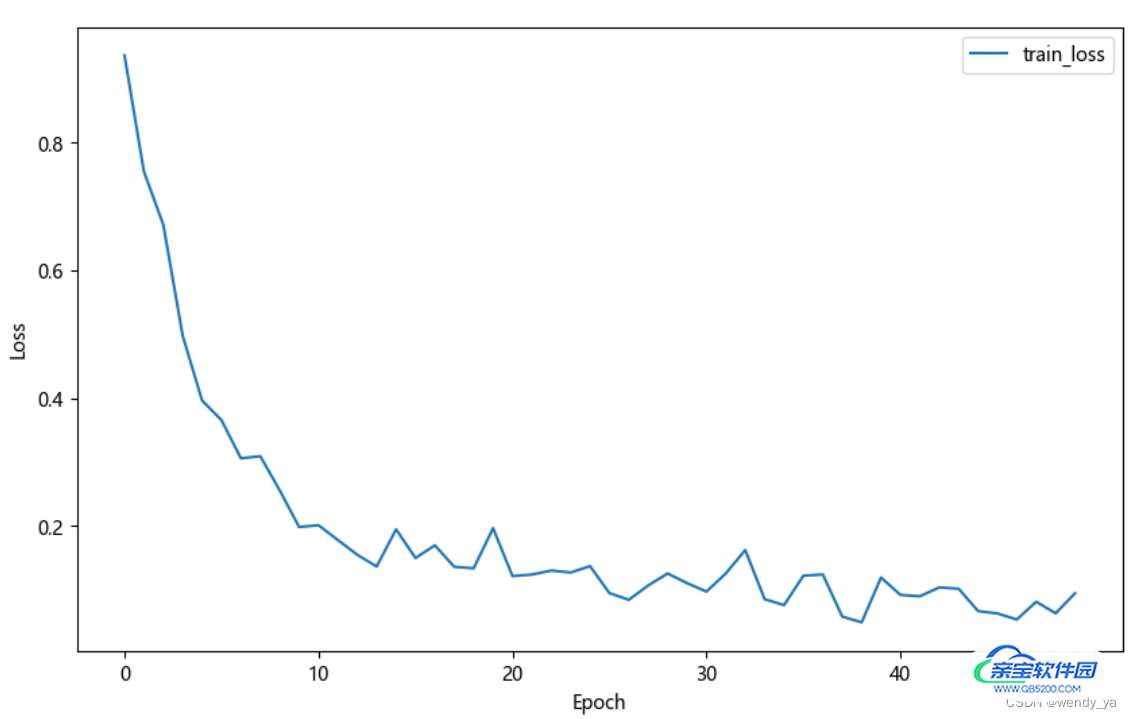Python利用CNN实现对时序数据进行分类
wendy_ya 人气:0一、数据集介绍
数据集利用的是CPSC2020数据集。
训练数据包括从心律失常患者收集的10个单导联心电图记录,每个记录持续约24小时。

下载完成后的TrainingSet数据集包括两个文件夹,分别是data和ref。data和ref文件夹内分别有10个mat文件。
- data文件夹存储数据文件,每个文件以mat格式存储,n ∗ 1 n*1n∗1数组表示;
- ref文件夹为标签文件夹,每个文件以mat文件存储,结构体存储,包括S_ref,V_ref两个n*1数组,分别存储对应标签(S,V)的位置;
采样率为 400。
- S:室上早搏(SPB);
- V:心室早搏(PVC);
数据集链接如下:http://2020.icbeb.org/CSPC2020
二、数据预处理
2.1 获取原始数据
查看一下前1000个心电图数据:
datafile = 'E:/Wendy/Desktop/TrainingSet/data/A04.mat'# 采样率400 data = scio.loadmat(datafile) #rint(data) # dict sig = data['ecg']# (x,1) #print(sig) sig = np.reshape(sig,(-1)) # (x,)转换为一维向量 print(sig) sigPlot = sig[1:5*200]# # 获取前1000个信号 fig = plt.figure(figsize=(20, 10),dpi=400) plt.plot(sigPlot) plt.show()
运行结果:

2.2 获取原始标签
将标签数据转化为一维向量
datafile = 'E:/Wendy/Desktop/TrainingSet/ref/R04.mat'# 采样率400 data = scio.loadmat(datafile) #print(data) label = data['ref'][0][0] S_ref = label[0]; S_ref = np.reshape(S_ref,(-1)) # 转换为一维向量 V_ref = label[1]; V_ref = np.reshape(V_ref,(-1)) # 转换为一维向量
2.3 数据分割
数据分割为5s一个片段
思路:房早室早心拍和前后两个心拍均有关系,按照平均心率72计算,平均每个心拍的时间为60/72,因此5个心拍的时间为60/725=4.1667 4.1667s不好计算,故选择5s 5 ( 秒 ) s a m p r = 5 ∗ 400 = 2000 个 s a m p l e 5(秒)sampr = 5*400=2000个sample5(秒)sampr=5∗400=2000个sample
定义标签:0:其他;1:V_ref; 2:S_ref;
a = len(sig) Fs = 400 # 采样率为400 segLen = 5*Fs # 2000 num = int(a/segLen) print(num)
运行结果:
17650
其中Fs为采样率,segLen为片段长度,num为片段数量。
2.4 整合数据和标签
接下来需要整合数据和标签:
all_data=[]
all_label = [];
i=1
while i<num+1:
all_data.append(np.array(sig[(i-1)*segLen:i*segLen]))
# 标签
if set(S_ref) & set(range((i-1)*segLen,i*segLen)):
all_label.append(2)
elif set(V_ref) & set(range((i-1)*segLen,i*segLen)):
all_label.append(1)
else:
all_label.append(0)
i=i+1
type(all_data)# list类型
type(all_label)# list类型
print((np.array(all_data)).shape) # 17650为数据长度,2000为数据个数
print((np.array(all_label)).shape)
#print(all_data)运行结果:
(17650, 2000)
(17650,)
17650为数据长度,2000为数据个数。
2.5 保存
将数据保存为字典类型:
import pickle
res = {'data':all_data, 'label':all_label} # 字典类型dict
with open('./cpsc2020.pkl', 'wb') as fout: # #将结果保存为cpsc2020.pkl
pickle.dump(res, fout)
三、数据训练
3.1 读取数据并进行处理
将数据归一化并进行标签编码,划分训练集和测试集,训练集为90%,测试集为10%,打乱数据并将其扩展为二维:
import numpy as np
import pandas as pd
import scipy.io
from matplotlib import pyplot as plt
import pickle
from sklearn.model_selection import train_test_split
from collections import Counter
from tqdm import tqdm
def read_data_physionet():
"""
only N V, S
"""
# read pkl
with open('./cpsc2020.pkl', 'rb') as fin:
res = pickle.load(fin) # 加载数据集
## 数据归一化
all_data = res['data']
for i in range(len(all_data)):
tmp_data = all_data[i]
tmp_std = np.std(tmp_data) # 获取数据标准差
tmp_mean = np.mean(tmp_data) # 获取数据均值
if(tmp_std==0): # i=1239-1271均为0
tmp_std = 1
all_data[i] = (tmp_data - tmp_mean) / tmp_std # 归一化
all_data = []
## 标签编码
all_label = []
for i in range(len(res['label'])):
if res['label'][i] == 1:
all_label.append(1)
all_data.append(res['data'][i])
elif res['label'][i] == 2:
all_label.append(2)
all_data.append(res['data'][i])
else:
all_label.append(0)
all_data.append(res['data'][i])
all_label = np.array(all_label)
all_data = np.array(all_data)
# 划分训练集和测试集,训练集90%,测试集10%
X_train, X_test, Y_train, Y_test = train_test_split(all_data, all_label, test_size=0.1, random_state=15)
print('训练集和测试集中 其他类别(0);室早(1);房早(2)的数量: ')
print(Counter(Y_train), Counter(Y_test))
# 打乱训练集
shuffle_pid = np.random.permutation(Y_train.shape[0])
X_train = X_train[shuffle_pid]
Y_train = Y_train[shuffle_pid]
# 扩展为二维(x,1)
X_train = np.expand_dims(X_train, 1)
X_test = np.expand_dims(X_test, 1)
return X_train, X_test, Y_train, Y_test
X_train, X_test, Y_train, Y_test = read_data_physionet()
运行结果:
训练集和测试集中 其他类别(0);室早(1);房早(2)的数量:
Counter({1: 8741, 0: 4605, 2: 2539}) Counter({1: 1012, 0: 478, 2: 275})
3.2 构建数据结构
自行构建数据集:
# 构建数据结构 MyDataset
# 单条数据信号的形状为:1*2000
import numpy as np
from collections import Counter
from tqdm import tqdm
from matplotlib import pyplot as plt
from sklearn.metrics import classification_report
import torch
import torch.nn as nn
import torch.optim as optim
import torch.nn.functional as F
from torch.utils.data import Dataset, DataLoader
class MyDataset(Dataset):
def __init__(self, data, label):
self.data = data
self.label = label
#把numpy转换为Tensor
def __getitem__(self, index):
return (torch.tensor(self.data[index], dtype=torch.float), torch.tensor(self.label[index], dtype=torch.long))
def __len__(self):
return len(self.data)
3.3 搭建神经网络
搭建CNN网络结构:
# 搭建神经网络
class CNN(nn.Module):
def __init__(self):
super(CNN, self).__init__()
self.conv1 = nn.Sequential( # input shape (1, 1, 2000)
nn.Conv1d(
in_channels=1,
out_channels=16,
kernel_size=5,
stride=1,
padding=2,
), # output shape (16, 1, 2000)
nn.Dropout(0.2),
nn.ReLU(),
nn.MaxPool1d(kernel_size=5), # choose max value in 1x5 area, output shape (16, 1, 400)2000/5
)
self.conv2 = nn.Sequential( # input shape (16, 1, 400)
nn.Conv1d(16, 32, 5, 1, 2), # output shape (32, 1, 400)
nn.Dropout(0.2),
nn.ReLU(),
nn.MaxPool1d(kernel_size=5), # output shape (32, 1, 400/5=80)
)
self.out = nn.Linear(32 * 80, 3) # fully connected layer, output 3 classes
def forward(self, x):
x = self.conv1(x)
x = self.conv2(x)
x = x.view(x.size(0), -1)
output = self.out(x)
#output.Softmax()
return output, x
cnn = CNN()
print(cnn)
运行结果:
CNN(
(conv1): Sequential(
(0): Conv1d(1, 16, kernel_size=(5,), stride=(1,), padding=(2,))
(1): Dropout(p=0.2, inplace=False)
(2): ReLU()
(3): MaxPool1d(kernel_size=5, stride=5, padding=0, dilation=1, ceil_mode=False)
)
(conv2): Sequential(
(0): Conv1d(16, 32, kernel_size=(5,), stride=(1,), padding=(2,))
(1): Dropout(p=0.2, inplace=False)
(2): ReLU()
(3): MaxPool1d(kernel_size=5, stride=5, padding=0, dilation=1, ceil_mode=False)
)
(out): Linear(in_features=2560, out_features=3, bias=True)
)
3.4 开始训练
优化器利用的是Adam优化器,损失函数使用crossEntropy函数。
代码略
50个epoch的运行效果如下:

加载全部内容